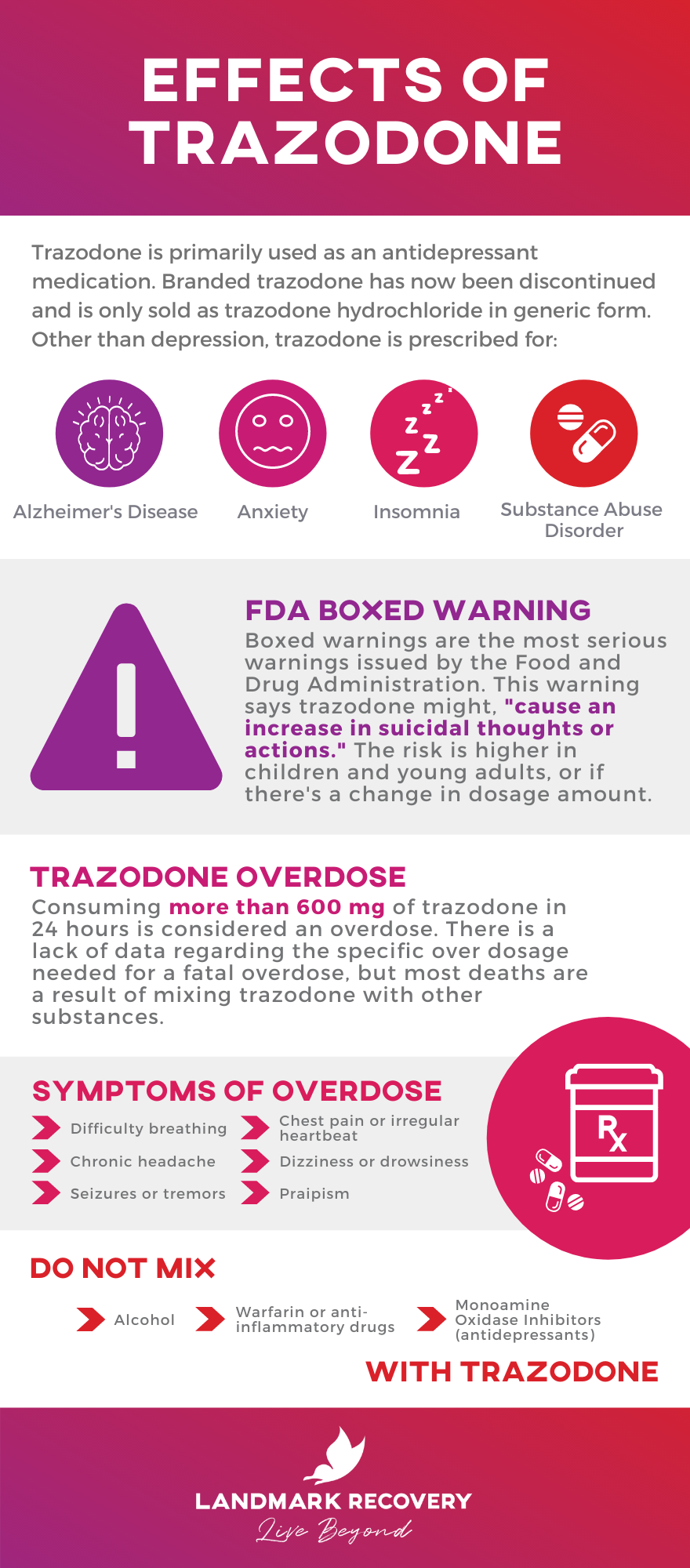Whether trazodone is used to treat depression or prescribed off-label, many people who benefit from this medication have questions about the effects of a trazodone overdose. We’ll explore what happens if you take too much of this antidepressant, a medication from the SARI (serotonin antagonist and reuptake inhibitor) group of drugs.
WHAT IS TRAZODONE?

Trazodone is primarily used as an antidepressant medication to treat the symptoms of depression. Once available as Desyrel and Oleptro, branded trazodone has now been discontinued. Trazodone hydrochloride now comes in generic form. Trazodone – marketed under the name Desyrel – was approved by the FDA back in 1981 as an antidepressant. Today, though, Trazodone is routinely prescribed off-label. This means it’s used for a different purpose than what’s covered by FDA approval.
So, as well as being used as an antidepressant, Trazodone is also prescribed for:
- Alzheimer’s disease
- Anxiety
- Bulimia
- Insomnia
- Substance abuse disorder
Why is trazodone used for insomnia? Well, other antidepressants are more effective when it comes to treating the symptoms of major depression but trazodone has mild sedating properties that make it beneficial for dealing with sleep disorders.
How does the drug work, then?
HOW DOES IT WORK?
Trazodone regulates the production of serotonin and increases the availability of this feel-good chemical in the brain. Serotonin is linked to mood. With more serotonin in the central nervous system, sleep becomes easier while symptoms of depression are mitigated. Unlike benzodiazepines, trazodone has no real addiction-causing mechanism. For this reason, it’s often prescribed for patients with a history of benzo abuse.
HOW TO TAKE TRAZODONE
Trazodone comes in the form of oral tablets. Dosage depends on the condition it’s being used to treat and any other medications you might be taking. Normally, you’ll start out taking a low dosage of trazodone which can be tweaked over time. The goal is to prescribe the lowest dose that gives you the required effect. Tablets come in varying strengths:
- 50mg
- 100mg
- 150mg
- 300mg
A typical starting dosage is 150mg a day in multiple doses. This can be increased by up to 50mg every few days if necessary up to a maximum dosage of 400mg in divided doses. In a hospital setting, up to 600mg of trazodone can be administered daily. Trazodone should not be used for individuals under 18.
TRAZODONE: FDA-BOXED WARNING
It is important to understand the warning signs of trazodone overdose. Trazodone carries a boxed warning from the FDA. Boxed warnings are the most serious warnings issued by the Food and Drug Administration. These warnings aim to alert both doctors and patients to potentially dangerous effects of drugs. With trazodone, like many antidepressants, there’s a small but notable risk of suicide. According to the FDA, trazodone might “cause an increase in suicidal thoughts or actions.” This risk is higher in children and young adults and also higher when treatment begins or if there’s a change in dosage.
If you notice any sudden changes in “mood, behaviors, thoughts, or feelings” when taking trazodone, call your healthcare provider immediately.
TRAZODONE SIDE EFFECTS
The more common side effects of trazodone can include:
- Blurred vision
- Diarrhea
- Dizziness
- Sleepiness
- Stuffy nose
- Swelling
- Weight loss
These effects should go away within a week or so. If they persist or become more severe, speak with your doctor. Taking trazodone can also trigger some more serious side effects. Seek immediate medical assistance in the event of the following:
DEPRESSIVE THOUGHTS AND SUICIDAL THOUGHTS
- Acting aggressively, angrily, or violently
- Acting on dangerous impulses
- Agitation
- Anxiety (new or worsening)
- Any unusual changes in behavior or mood
- Attempts to commit suicide
- Depression (new or worsening)
- Insomnia
- Irritability (new or worsening)
- Mania
- Panic attacks
- Restlessness
- Thoughts about suicide or dying
SEROTONIN SYNDROME
- Accelerated heart rate
- Agitation
- Confusion and trouble thinking
- Diarrhea
- Hallucinations
- Nausea
- Problems with coordination
- Tight muscles
- Trouble walking
- Vomiting
OTHER PROBLEMS
- Blurred vision or other changes in vision
- Bruising and bleeding
- Dizziness
- Erections lasting longer than 6 hours
- Eye pain
- Fainting
- Irregular or fast heartbeat
- Low blood pressure
- Swelling or redness of the eye
You should also be aware of how some other drugs interact with trazodone…
DRUGS THAT DO NOT WORK WELL WITH TRAZODONE
You should not use any MAOIs (monoamine oxidase inhibitors) when you’re taking trazodone. This class of drug – the first antidepressants developed – include:
- Isocarboxazid
- Phenelzine
- Selegiline
- Tranylcypromine
By taking any of these MAOIs within 14 days of taking trazodone, you’ll increase your risk of contracting serotonin syndrome. Other drugs also magnify the effects of trazodone.
- Antidepressants: Some drugs used to treat depression like citalopram and paroxetine can heighten your risk of serotonin syndrome when taken alongside trazodone. This condition can be fatal
- CNS depressants: Any central nervous system depressants like secobarbital and pentobarbital can increase the response to any other CND depressants and barbiturates
- Digoxin: Taking trazodone at the same time as digoxin can boost the levels of digoxin in the body to dangerous levels
- NSAIDs (Nonsteroidal anti-inflammatory drugs): Risk of bleeding is increased when taking trazodone and NSAIDs or aspirin at the same time
- Warfarin: If you’re taking a blood-thinning agent like warfarin, your risk of bleeding is increased if you’re also taking trazodone
As you can see, then, trazodone can potentially interact with a range of other medications. Speak with your doctor if you’re using any other drugs at the same time. With all those regular side effects, how about actually overdosing on trazodone? Is this possible?
If you or someone you know is struggling with an addiction to Trazodone or other antidepressants and is searching for an inpatient rehab facility, call us at [crb_phone]888-448-0302[/crb_phone] to chat with a recovery specialist. We are available 24/7 to answer your questions and get you the information you need to make the best recovery decision for you. Your call is 100% confidential, and we are ready to help you get started whenever you decide that it’s the right time.
THE RISK OF OVERDOSE ON TRAZODONE
Overdosing on trazodone is technically possible but uncommon and unlikely. Almost without exception, trazodone overdose occurs in a patient prescribed the drug. Since trazodone doesn’t induce a high, it has no recreational value. All that’s achieved by taking more of the drug is an increase in the drug’s ability to trigger drowsiness. So, where an overdose on opioids typically occurs as a result of someone chasing a high, with trazodone overdoses are normally unintentional. This is not always the case, though…
Some patients using trazodone feel so depressed they try taking more of the medication in an attempt to alleviate their symptoms. This does not work out and an overdose can ensue. Others try taking too much trazodone in an attempt to self-harm. How much trazodone constitutes an overdose, then?
HOW MUCH TRAZODONE IS NEEDED TO OVERDOSE?
When used to treat depression, the standard daily dose of trazodone is 150mg. This can be gradually increased to 600mg if required in a hospital backdrop. Much smaller doses are used for treating insomnia to a maximum of 75mg. If you consume more than 600mg of trazodone in 24 hours, this constitutes an overdose.
There’s a lack of data regarding the specific dosage needed for a fatal overdose. Most deaths linked to trazodone are the result of the antidepressant being mixed with other substances. Alcohol should be completely avoided when you’re taking trazodone since alcohol and trazodone make a poor combination. Bottom line, under no circumstances take more than 600mg of trazodone in any 24-hour period.
SYMPTOMS OF TRAZODONE OVERDOSE
A trazodone overdose is characterized by a range of potentially-life threatening symptoms linked to specific areas of the body. These can be categorized as follows:
- Lungs and airways
- Heart and blood vessels
- Central nervous system
- Male Genitalia
LUNGS AND AIRWAYS
Difficulty breathing or stopped breathing can occur as a result of trazodone overdose. This is due to respiratory depression with your lungs failing to expand and contract properly.
HEART AND BLOOD VESSELS
Chest pain and an irregular heartbeat can both take place following trazodone overdose. Keep an eye on your blood pressure, too. BP levels can drop so low as to bring about fainting. Trazodone overdose can also dramatically slow down your heart rate.
CENTRAL NERVOUS SYSTEM
The medical benefits you reap from taking trazodone come about through the way the drug directly impacts the CNS (central nervous system). Because of this, it makes sense that most of the overdose symptoms are linked directly to the brain.
Watch out for:
- Chronic headache
- Coma
- Dizziness
- Drowsiness
- Seizures
- Tremors
- Uncoordinated actions
MALE GENITALIA
In some cases, trazodone overdose brings about abnormal erections lasting for hours. This is a condition known as priapism. Although the erection should subside within 24 hours even without treatment, it can cause permanent damage to the genitals. If this happens to you as a result of trazodone overdose, apply ice and take a painkiller then head straight to ER.
TREATMENT FOR TRAZODONE OVERDOSE
If you or a loved one exhibit any symptoms of trazodone overdose – especially if you suspect you’ve taken more than 600mg – you should contact poison control and also call 911. Provide the emergency responder the age, weight, and height of the individual along with the quantity and timeframe of trazodone ingested. There’s no antidote required for trazodone overdose. In almost all cases, trazodone overdose is manageable.
WHAT TO DO NEXT
If you or a loved one are concerned about any aspect of trazodone overdose, you should seek immediate medical care so you can get back on track. If you’re concerned about addiction or depression, give us a call here at Landmark Recovery on 888-448-0302. We’ll be delighted to help in any way we can.
[crb_large_cta]

Choose Recovery Over Addiction
We're here 24/7 to help you get the care you need to live life on your terms, without drugs or alcohol. Talk to our recovery specialists today and learn about our integrated treatment programs.




